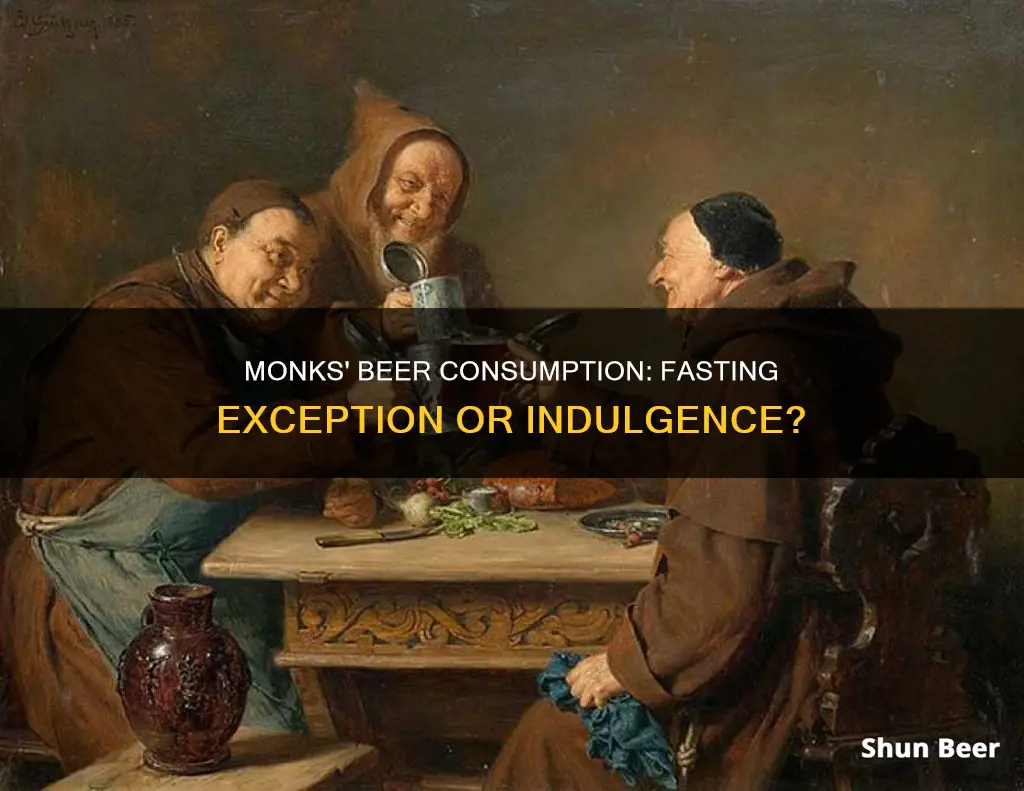
During the Middle Ages, German monks would observe Lent by abstaining from solid food and consuming only beer and the Eucharist. This practice was also adopted by monks in 17th-century Italy who, upon relocating to Bavaria, were forbidden from consuming solid food during the Lenten season. To sustain themselves, these monks brewed a strong, nutrient-rich beer, which they called liquid bread. This beer, an early doppelbock, was eventually sold in the community by the Paulaner brewery, which still operates today.
| Characteristics | Values |
|---|---|
| Century | 17th |
| Religion | Catholic |
| Order | Paulaner Monks |
| Location | Southern Italy to the Cloister Neudeck ob der Au in Bavaria |
| Fasting Period | Lent |
| Fasting Duration | 40 days |
| Fasting Method | Liquid-only diet |
| Beverage | Beer |
| Beer Type | Doppelbock-style |
| Beer Name | Salvator |
| Beer Translation | Holy Father Beer |
| Beer Purpose | Sustenance and nutrition |
| Beer Effects | Increased focus and clarity |
What You'll Learn

German monks in the Middle Ages drank beer and took the Eucharist during Lent
In the 17th century, German monks in the Order of Minims observed a strict ascetic lifestyle, abstaining from all meat and dairy products. During Lent, they took this a step further, fasting from solid food and consuming only a special brew of beer they had created. This beer, an early doppelbock-style beer, was full of carbohydrates and nutrients, and was dubbed "liquid bread" as it was believed that liquids cleansed both body and soul.
The Paulaner monks, who had moved from Southern Italy to the Cloister Neudeck ob der Au in Bavaria, were not allowed to consume solid food during Lent. As beer was a common staple of the time in their region, they turned to this beverage to sustain them during their fast. They concocted an "unusually strong" brew, so malty and rich that they could survive on it alone for the entire 40 days of Lent.
The monks' doppelbock was so tasty that they feared it no longer qualified as a Lenten sacrifice. Around the year 1700, they sent a barrel to Rome, asking the Pope for his opinion. By the time the beer reached Rome, it had spoiled, and the Pope agreed that drinking it would be a sacrifice. Thus, the monks continued to brew and drink their doppelbock during Lent with clear consciences.
The Paulaner brewery, founded in Munich in 1634, still brews this doppelbock today. It is called Salvator, which roughly translates as "Holy Father beer." The monks eventually sold this beer in the community, and it gained local fame. Today, Paulaner serves 70 countries and is one of the chief breweries featured at Munich's Octoberfest.
Beer and Kidney Transplants: What Patients Should Know
You may want to see also

Monks called beer liquid bread
Monks called beer "liquid bread" because it was considered a cheap meal, suitable for both monks and laymen. In the Middle Ages, beer was a safer alternative to water and milk, which were often polluted. The brewing process eliminated all bacteria, making beer healthier. Beer was also cheaper than wine, which was expensive to produce in northern Europe.
In the 1600s, Paulaner monks from Southern Italy moved to Bavaria, where they were not allowed to consume solid food during Lent. To sustain themselves, they turned to beer, which was a common staple in the region. They brewed an unusually strong beer, full of carbohydrates and nutrients, which they called "liquid bread". This was an early doppelbock-style beer, which the monks sold in the community. They named it "Salvator", which roughly translates to "Holy Father beer".
The practice of drinking beer during fasting periods was not limited to the Paulaner monks. German monks in the town of Einbeck also developed a specific style of malty, dark, high-alcohol beer to help them during intense fasting periods. This beer became known as Bock, after the town of Einbeck. Later, monks developed an even stronger variant called Doppelbock, meaning double Bock. This beer was so nutritious that some monks called it "liquid bread".
Sober People and Non-Alcoholic Beer: A Safe Choice?
You may want to see also

The monks' beer was an early doppelbock-style beer
The monks' doppelbock was first brewed in the 17th century by Paulaner monks who had moved from Southern Italy to Bavaria. As they were not allowed to consume solid food during Lent, they turned to beer as a source of nutrition. The monks concocted an "unusually strong" brew, full of carbohydrates and nutrients, because "liquid bread wouldn't break the fast". They named their beer "Salvator", which roughly translates to "Holy Father beer".
The Paulaner monks' doppelbock was an original product of the Paulaner brewery, which was founded in 1634. The brewery became a major source of income for the monastery, and in 1799, the monks opened their first public beer hall, which quickly became a popular destination. Today, Paulaner is one of the chief breweries featured at Munich's Octoberfest and serves 70 countries worldwide.
The monks' doppelbock was not just a source of nutrition during Lent, but also had a distinctly penitential origin. The practice of fasting on doppelbock was later taken up by Catholics during Lent, who would abstain from sweets, technology, alcohol, and other luxuries. In 2011, a Christian journalist named J. Wilson attempted to recreate the monks' beer fast, consuming only a special doppelbock brew for 46 days during Lent. He described the experience as transformative, noting that it taught him about the capabilities of the human body and the importance of self-discipline.
Non-Alcoholic Beer: Safe Post-Pancreatitis Treat or Misstep?
You may want to see also

The beer was named Salvator, which means Holy Father beer
The practice of monks drinking beer during fasting periods has an interesting history, and it is said that "liquid bread" was consumed as a source of nutrition when actual bread was restricted. A quick Google search reveals that yes, monks did indeed drink beer during fasting, and one particular beer named "Salvator" has an intriguing story behind it.
The name "Salvator" for this beer is derived from the Latin "Sanctus Salvator," meaning Holy Savior or Holy Father. This name is a clear indication of the beer's origins and purpose, deeply rooted in the Christian faith and monastic traditions. The Paulaner monks of Munich, Germany, are credited with creating this special brew, and it has since become a well-loved tradition, not only within the monastic community but also among beer enthusiasts worldwide.
This beer style, now known as a "Maibock," was first brewed in the 17th century and was specifically crafted to sustain the monks during their Lenten fasts, providing them with essential nutrients and calories. The name "Salvator" was a tribute to their faith, and the beer became an integral part of their religious observances. Over time, the beer gained popularity beyond the monastery walls, and the Paulaner brewery was established to meet the growing demand.
Today, Salvator is a registered trademark of the Paulaner brewery, and the beer is widely available, especially during the Lent and Easter seasons. It is a strong, full-bodied lager, typically with an alcohol content of 7-8%, and is characterized by its malty sweetness and smooth, slightly hoppy flavor. The beer's name and its association with the monks and their fasting traditions have undoubtedly contributed to its enduring appeal, making it a beloved choice for those seeking a traditional, flavorful beer with a unique historical backdrop.
Beer and Calcium: What's the Connection?
You may want to see also

A journalist in 2011 recreated the monks' beer fast
In 2011, a journalist by the name of J. Wilson recreated the beer fast undertaken by monks in the 17th century. Wilson, a Christian and editor for a county newspaper in Iowa, partnered with a local brewery to produce a special doppelbock beer. Over 46 days during Lent, Wilson consumed nothing but this beer, forgoing all solid food.
Wilson had regular check-ups with his doctor and obtained permission from his boss for the fast. He drank four beers over the course of a workday and five beers on Saturdays and Sundays. Despite the alcoholic nature of the fast, Wilson described the experience as transformative and not intoxicating.
Wilson documented his experience in a blog for CNN, where he wrote about the lessons he learned about the capabilities of the human body. He wrote:
> "Aside from cramming it [the body] full of junk food, we don’t ask much of it. We take it for granted. It is capable of much more than many of us give it credit for. It can climb mountains, run marathons and, yes, it can function without food for long periods of time."
Wilson also noted that he faced challenges during the fast, including acute hunger in the initial days and the difficulty of fasting from media. He received numerous interview requests from media outlets but chose to decline some of them to stay focused on the spiritual purpose of his fast.
Wilson's experiment proved that monks' beer fasting was not only possible but probable. He concluded that the practice allowed the monks to refocus on God and their own shortcomings, helping them to refine themselves.
Beer Belly: Can You Drink Without Gaining Weight?
You may want to see also
Frequently asked questions
Yes, German monks in the 17th century would do the entire Lenten fast on beer and the Eucharist alone.
The monks were not allowed to consume solid food during Lent, so they turned to beer, or "liquid bread", to sustain them.
The monks brewed a special, unusually strong beer, an early doppelbock-style beer, which they named "Salvator", meaning "Holy Father beer".
Yes, in 2011, J. Wilson, a Christian working as an editor for a county newspaper in Iowa, partnered with a local brewery and brewed a special doppelbock that he consumed over 46 days during Lent, eating no solid food.







